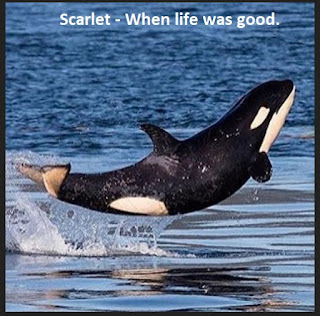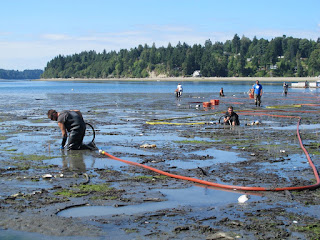Why do lawsuits have to be filed to prevent this
from happening to Puget Sound's tidelands?
Zangle Cove: Like a fungus, PVC and netting
begin to spread over the tidelands of Zangle Cove,
adding to that spread throughout Puget Sound.
"Plastic free July" is over. Back to planting
PVC tubing in Puget Sound's tidelands.
Puget Sound's entire food web
is being impacted by this.
1: Zangle Cove/Wild Fish Conservancy/Coalition to Protect Puget Sound Habitat vs Washington Department of Fish and Wildlife and Pacific Northwest Aquaculture
Geoduck are grown for nothing more than satisfying a Chinese superstition with what Washingtonians consider a "junk clam". This tideland owner claims he "wants to feed the world". In fact, the "world" he refers to is little more than the elite in China who are able to afford a $100/pound clam and a few curious tourists. After clearing the tidelands of what is believed to be the oldest living species, up to 168 years old, the operator returned and populated the tidelands with PVC piping and netting, transforming these tidelands forever.
Zangle Cove Lawsuit Papers - Why Hydraulic Permits should be required.
Protect Zangle Cove, The Coalition to Protect Puget Sound Habitat and the Wild Fish Conservancy have filed a suit against Washington's Department of Fish and Wildlife demanding hydraulic permits be required for these activities. Unlike a dock or bulkhead, these structures being placed within Puget Sound's waters and tidelands avoid any oversight by WDFW, the result of nothing more than a flawed interpretation of a flawed Attorney General opinion.
As detailed in the petitioners opening brief, filed by Lane Powell's Claire Loebs and Richard Lintermans, WDFW not requiring HPA's for impacts to aquatic habitat from aquaculture's actions was not a legislative action but a misreading of an AG opinion. In that opinion, they accurately state:
"..no mention is made of aquaculture’s other potential harmful effects to wild fish that the Hydraulic Code might prevent, such as the destruction of habitat, removal of food sources, and release of pollutants." (p.12)Response to Motion for Judgement - "a distraction and a waste of judicial resources"
In addition to the owner's waste of Puget Sound's natural resources in the quest for extracting revenue from Washington's most valuable marine ecosystem - the intertidal area over which waters ebb and flow daily - papers filed by the operator and owner were described this way:
"PNA’s [Pacific Northwest Aquaculture] Motion for Judgment is untimely, will waste the resources of the Court, and in the end, would have little impact on the practical resolution of any matter before the Court. The Court should decline to consider the Motion for Judgment separate from the hearing on the merits"
2: Coalition to Protect Puget Sound Habitat/Center for Food Safety vs US Army Corps - Cumulative impacts matter and they are real.
The things you discover in discovery.
In a separate but related lawsuit the Coalition to Protect Puget Sound Habitat and the Center for Food Safety have filed suit against the US Army Corps claiming they did not adequately consider cumulative impacts in their approving of permits for aquaculture. During the period of discovery, in which information is presented by various parties to be used in their case, a draft of a cumulative impact analysis by the Corps was found. The Coalition found within that draft the following:
“The proposed action is likely to adversely affect designated critical habitat for several species listed under the ESA including Puget Sound Chinook salmon, Hood Canal summer run chum salmon, and Puget Sound steelhead.” p. 101
“Given the magnitude of the impacts in acreage, the importance of eelgrass to the marine ecosystem, and the scale of the aquaculture impacts relative to other stressors, the impacts are considered significant.” p. 103
“The action does threaten a violation of State requirements under the Shoreline Management Act to achieve no net loss of eelgrass and Federal requirements to protect eelgrass imposed under the ESA for aquaculture activities. The proposed action is not consistent with either of these requirements.” p. 101
“The conclusion therefore is that significant cumulative effects to surf smelt and sand lance spawning habitat would occur due to the proposed action.” p. 112
“The proposed action is inconsistent with State requirements under the SMA to protect forage fish spawning habitat.” p. 111Additional comments in papers filed in response to those filed by the Corps and Taylor Shellfish are found in the PLAINTIFF COALTION’S REPLY IN SUPPORT OF PLAINTIFF’S MOTION FOR SUMMARY JUDGMENT, and PLAINTIFF COALITION’S MEMORANDUM IN OPPOSITION TO DEFENDANTS’ CROSS MOTIONS FOR SUMMARY JUDGMENT. In that filing, attorney Karl G Anuta notes:
"... the Corps and Taylor (hereafter collectively referred to as “Defendants”) present a range of factual arguments that appear to be little more than an attempt to confuse the issues at hand. Defendants also ask the court to ignore the documents and actual facts present in the Record..."
"... the Corps failed to take all the steps required by NEPA, and the CWA. The Corps ignored the analysis of their own staff about the significant impacts that NWP 48 was having and was likely to have in the future."
"The arguments presented by Defendants to try to justify what the Corps did are both factually and legally invalid. Defendants neither make compelling arguments that support the agency position, nor successfully challenge the arguments brought by CPPSH. The positions taken by counsel for the Defendants are, for the most part, little more than post hoc rationalization efforts that are not consistent with the Decision Documents in the actual Record."Get involved. Donations are tax deductible.
Puget Sound's marine ecosystem supports a wide diversity of species which are being impacted by industrial aquaculture. It is not benign and impacts are cumulative. You can help with donations to the Coalition to Protect Puget Sound Habitat; Wild Fish Conservancy; and Center for Food Safety.


























